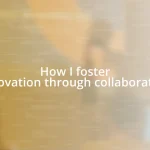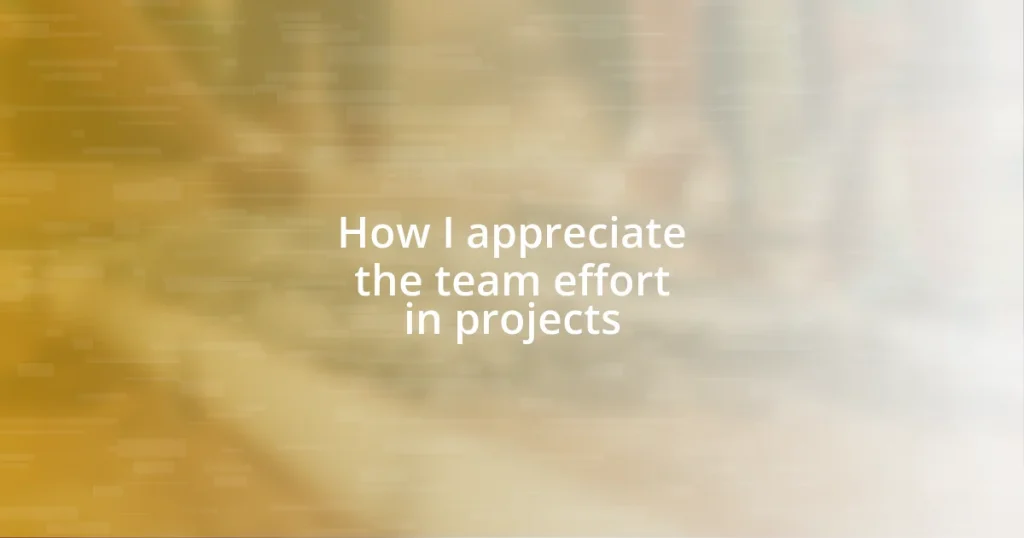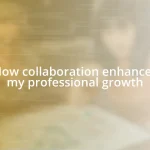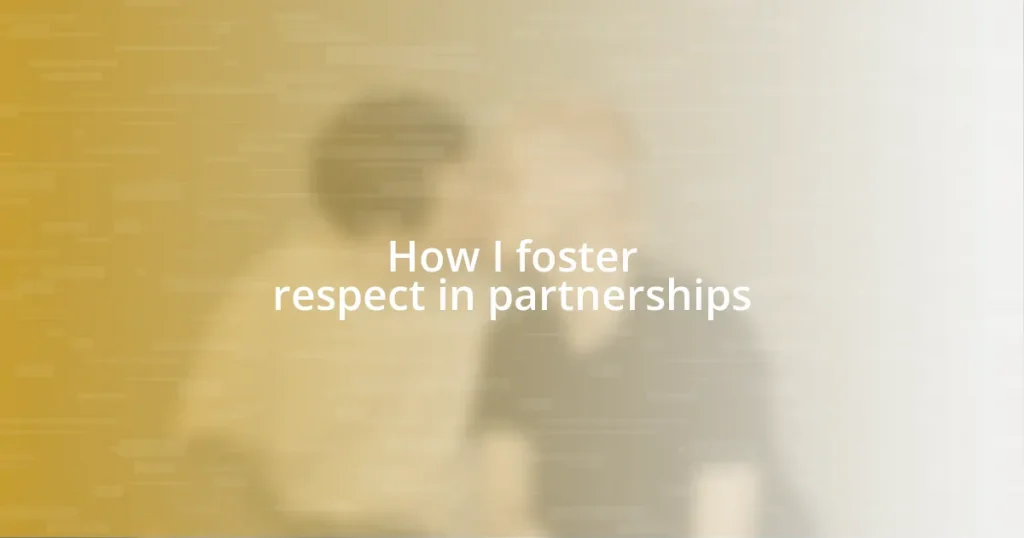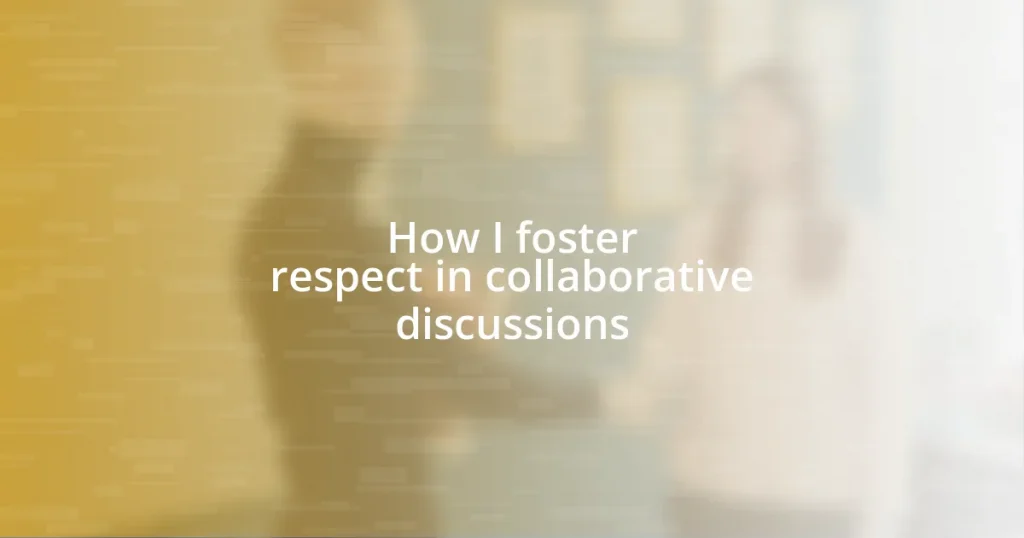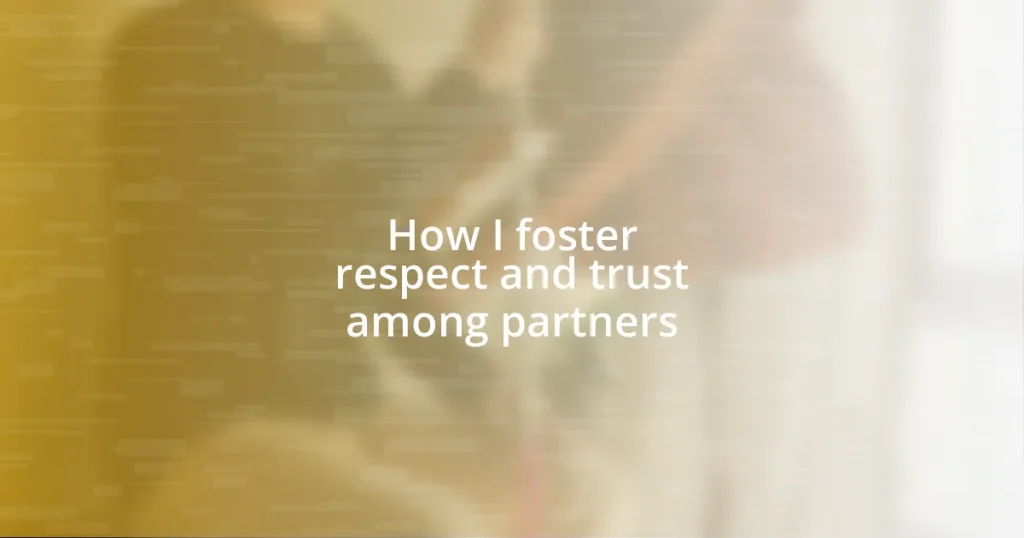Key takeaways:
- Team effort fosters innovation and a sense of shared ownership, enhancing creativity and mutual respect among members.
- Recognizing individual contributions boosts morale and creates an environment conducive to collaboration and personal growth.
- Implementing open communication and feedback cultivates trust, encourages active listening, and ultimately leads to team success and resilience.
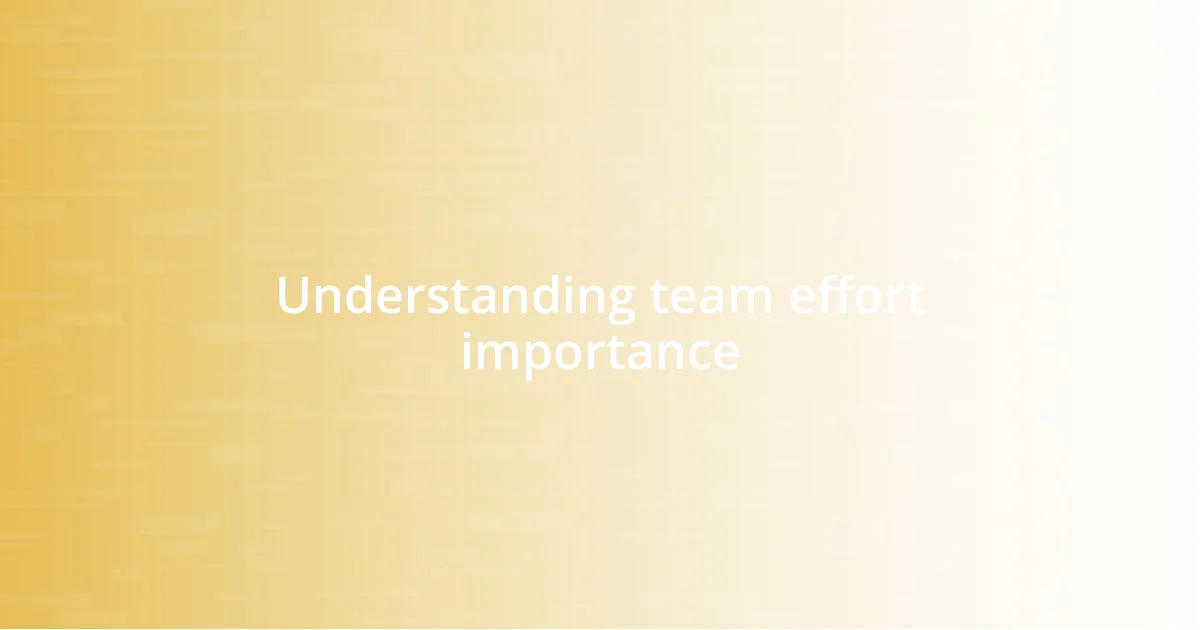
Understanding team effort importance
Team effort is crucial because it combines diverse skills and perspectives, leading to solutions that one individual might overlook. I remember a project where our team faced a significant roadblock. It wasn’t until we all gathered around the table, each sharing our unique viewpoints, that we pinpointed the issue and crafted an innovative solution. Did you ever feel stuck on a problem and find that collaboration opens doors you didn’t even know existed?
When everyone contributes their strengths, it creates a sense of shared ownership and accountability. For instance, during a recent project, I saw how my colleague’s attention to detail balanced my big-picture thinking. This synergy not only enhanced our results but also fostered a deeper mutual respect among us. Can you recall a time when teamwork made the difference in your work life?
Ultimately, the emotional benefits of a united team can’t be overstated. Letting others into your process allows vulnerability and trust to flourish. I cherish moments when laughter and camaraderie broke through the stress, reminding us that we’re not just co-workers but allies striving for a common goal. Doesn’t that sense of community propel us forward?
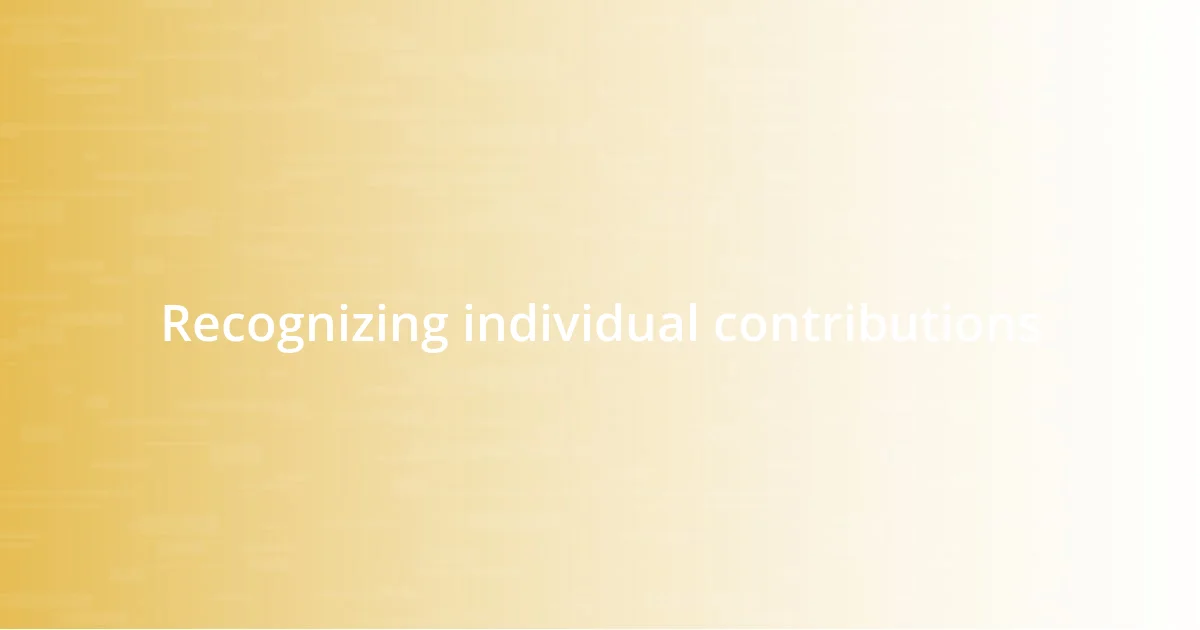
Recognizing individual contributions
Recognizing individual contributions is vital for maintaining morale and motivation within a team. I’ve had instances where I made a point to highlight a colleague’s unique talent, like when Sarah devised a creative marketing strategy during a tight deadline. Her innovative approach not only saved our project but also empowered her with a newfound confidence that radiated across the team. When people feel seen and valued for their individual contributions, it fosters an environment of collaboration and innovation.
Here are some simple yet impactful ways to recognize individual contributions:
- Verbal Praise: Acknowledge someone’s specific contribution during team meetings.
- Personalized Notes: Send a quick thank-you note highlighting what they did well.
- Spotlight Recognition: Feature team members in newsletters or on your company’s internal platform.
- Team Celebrations: Organize casual gatherings to celebrate milestones and individual efforts.
- Skill Development Opportunities: Offer avenues for growth based on their strengths, showing investment in their career.
Choosing to recognize each person’s contributions has the power to transform the atmosphere of any project. Each acknowledgment creates ripples of positivity that ultimately benefit everyone involved.
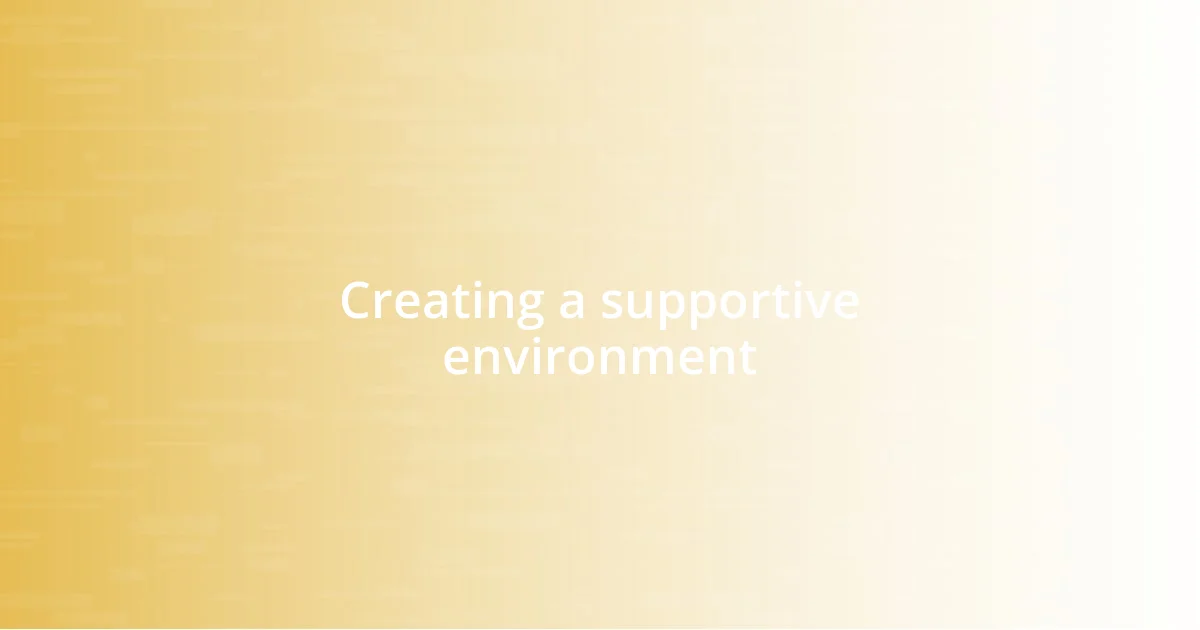
Creating a supportive environment
Creating a supportive environment is essential to fostering teamwork. I remember a time when our team was under pressure with an impending deadline. Our project manager organized regular check-ins where we could openly express concerns and brainstorm together. This transparency allowed us to support one another, cultivating trust that transformed mere colleagues into a true team. Have you ever been part of a work environment where your voice felt genuinely heard?
In another instance, I witnessed how a casual weekly lunch became a space for teammates to connect and share ideas outside of formal meetings. Sharing personal stories during these gatherings helped break down barriers and nurture relationships. It prompted creativity and collaboration that often spilled over into our work. Isn’t it interesting how informal settings can sometimes lead to profound breakthroughs?
Creating an environment where feedback is welcomed and celebrated can significantly enhance team dynamics. I cherish those moments when colleagues collaborated to provide constructive feedback, and it was always rooted in a desire to uplift rather than criticize. The result? We became more resilient and open to each other’s perspectives. Don’t you think an atmosphere of encouragement brings out the best in all of us?
| Supportive Environment Features | Benefits |
|---|---|
| Open Communication | Encourages honesty and trust among team members. |
| Regular Check-Ins | Provides a platform for sharing concerns and brainstorming solutions. |
| Informal Gatherings | Helps build relationships and fosters creativity. |
| Constructive Feedback | Strengthens collaboration and team resilience. |
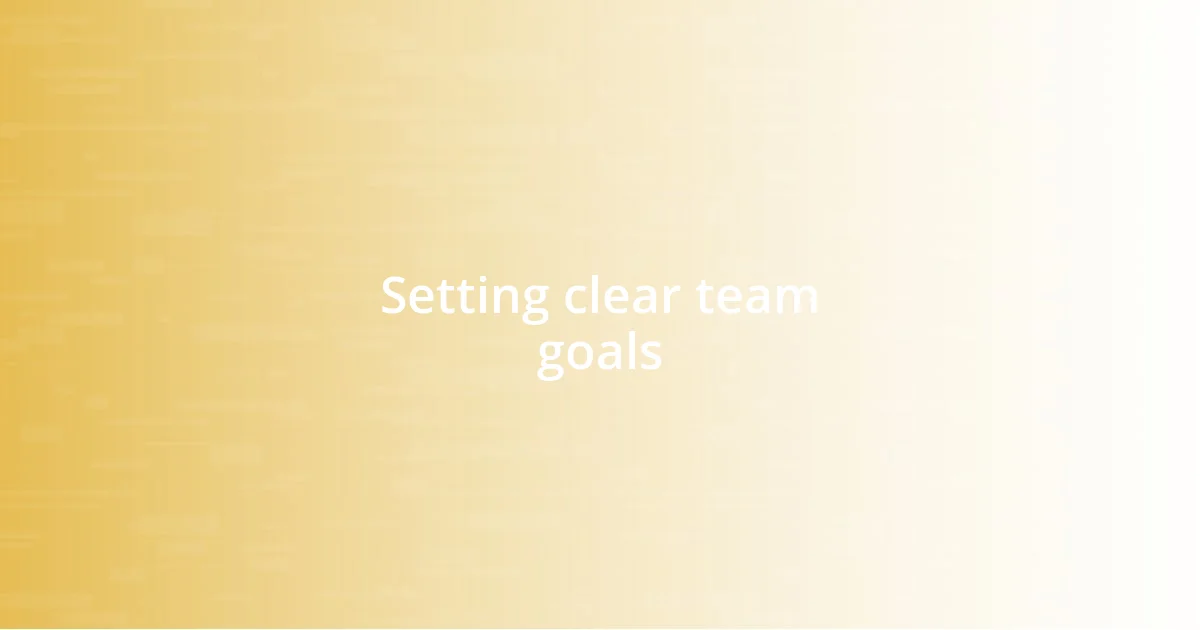
Setting clear team goals
Setting clear goals is fundamental for guiding a team toward success. I once worked on a project where we took the time to define our objectives collaboratively at the outset. It was eye-opening to see how everyone’s input shaped the final goals, giving every team member a sense of ownership. Have you ever noticed how having specific targets seems to ignite a shared focus and determination?
Moreover, clarity doesn’t just help us in knowing what to aim for; it fosters accountability too. I remember when our project had clear deadlines and deliverables outlined. Each week, we would review our progress, celebrating the small wins while addressing any setbacks. This transparency created a rhythm, allowing us to adjust our strategies as needed. Don’t you think that when accountability is shared, everyone is more invested in the outcome?
Ultimately, setting clear goals can transform an ordinary project into a cohesive effort. In another instance, our team used visual aids, like charts and timelines, to track our progress. It may sound simple, but seeing our advancements visually made the journey more satisfying. It instilled a sense of pride and urgency, making every member of the team feel integral to the project’s success. Isn’t it incredible how clarity and visual representation can enhance our collective drive?
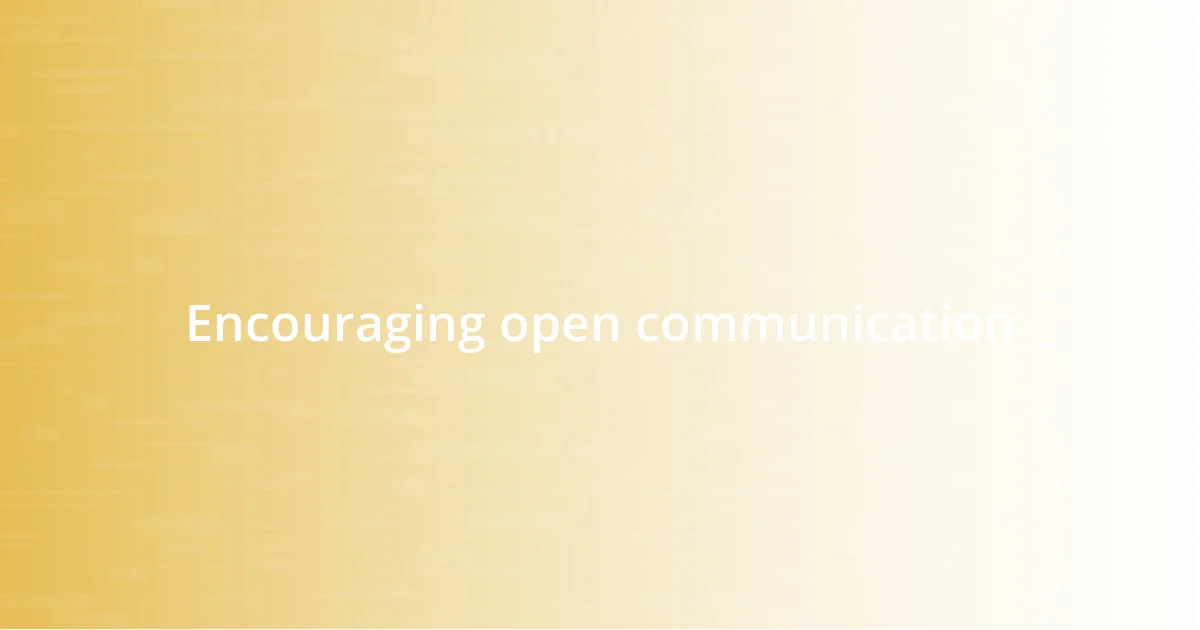
Encouraging open communication
Open communication is the heartbeat of effective teamwork. During a challenging project, I found that inviting everyone to share their thoughts openly during brainstorming sessions created a sense of camaraderie. It was as if a weight had been lifted; our discussions were richer, and we all felt empowered to contribute. Have you experienced the relief that comes from knowing you can share your ideas without judgment?
Reinforcing a culture of transparency encourages team members not just to speak, but to listen actively, too. I’ve observed how our team began to embrace “active listening” which led to richer discussions and understanding. It felt rewarding to see someone light up when their idea sparked enthusiasm in another, creating an energetic chain reaction. When did you last feel that kind of synergy in your team?
The impact of regular feedback can’t be overstated. I remember participating in a feedback loop where we rotated between giving and receiving suggestions on our work. It was a powerful experience; rather than feeling criticized, we began to see feedback as a tool for growth. There’s something profoundly motivating about knowing you’re valued enough for your colleagues to invest time in helping you improve. Wouldn’t you agree that a culture that thrives on open communication can elevate our collective performance to unimaginable heights?
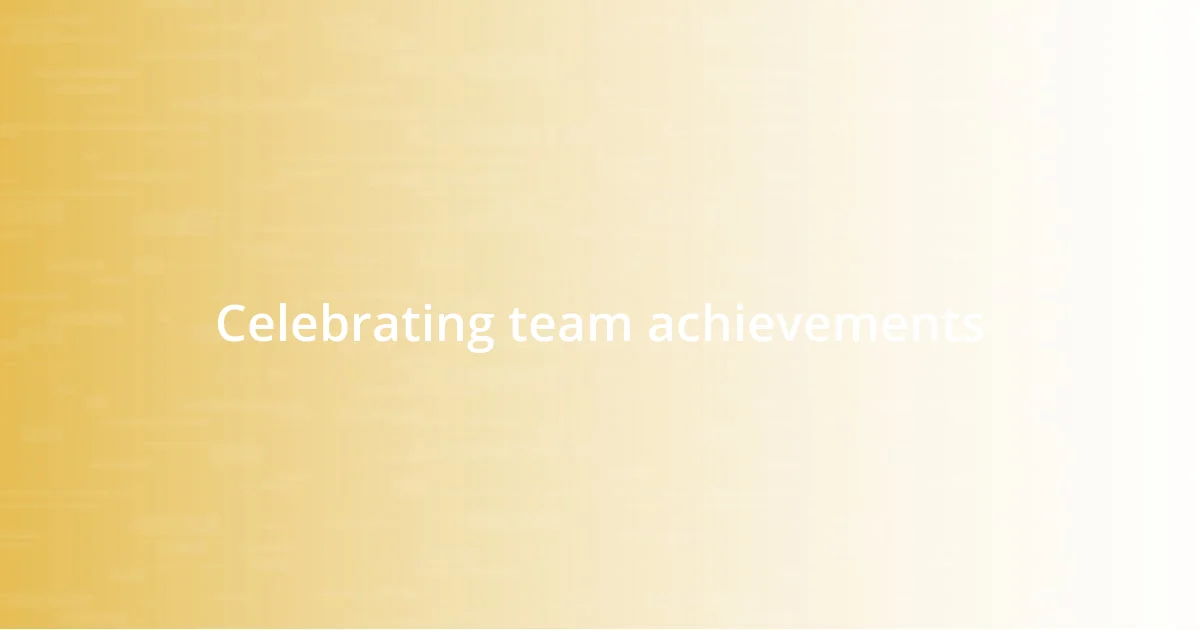
Celebrating team achievements
Celebrating team achievements is one of the most rewarding aspects of any project. I still remember the thrill of our team gathering after completing a significant milestone. We shared not just the achievement but also the journey, recounting the late nights and brainstorming sessions that led us to that point. Isn’t it amazing how looking back on those efforts can create stronger bonds among team members?
I believe recognition should be both spontaneous and structured. Recently, I organized a surprise coffee hour to celebrate a team member’s excellent presentation. Watching them beam with pride as their hard work was acknowledged made me realize how small gestures can have a massive impact on morale. Have you ever thought about how recognition can serve as fuel for future successes within a team?
Moreover, sharing victories doesn’t just lift spirits; it reinforces a culture of appreciation that motivates everyone to strive for excellence. During another project, we created a shared digital wall where we posted congratulatory notes and photos from our celebrations. It became a visual testament to our hard work, reminding us all of our collective capabilities. Do you think a simple acknowledgment can transform the way a team functions?
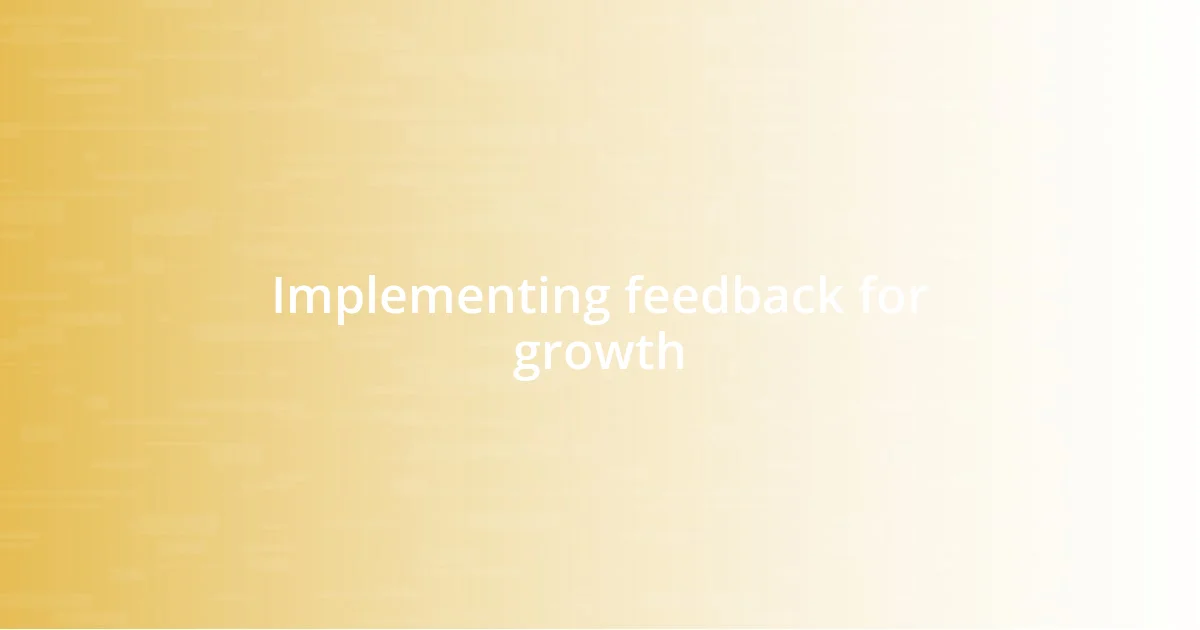
Implementing feedback for growth
Implementing feedback effectively is a game changer for any team. I recall a specific project where we decided to have bi-weekly feedback sessions. Initially, it felt daunting, but the atmosphere gradually shifted to one of trust and vulnerability. Have you ever felt the thrill of sharing insights knowing they would be welcomed with open minds? That’s what we experienced, and it lifted our collaboration to unexpected heights.
One approach that worked wonders for us was combining formal and informal feedback methods. I started casually checking in with team members after our weekly meetings. These short, friendly conversations allowed us to discuss challenges not just as a team but as friends. It was enlightening to hear their perspectives, and in turn, I felt more connected to their individual journeys. Isn’t it fascinating how those informal chats can unlock deep insights and foster personal growth?
Through my experience, I discovered that acting on feedback is where true growth happens. I remember adjusting my project management style based on constructive input from my team, which not only improved our workflow but also deepened mutual respect. When we embrace feedback as a valuable resource rather than a critique, it cultivates an environment where everyone thrives. How has feedback transformed the way you approach your projects?






